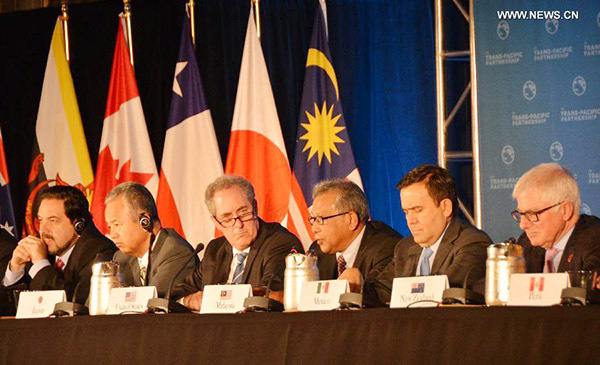
Trade ministers of the United States and 11 other Pacific Rim countries attend a press conference after negotiating the Trans-Pacific Partnership (TPP) trade agreement in Atlanta, the United States, on Oct. 5, 2015. (Photo/Xinhua)
In its initial promotion of the Trans-Pacific Partnership, the administration of U.S. President Barack Obama claimed that, once clinched, the agreement will not only remove various trade barriers among member states, it will also promote the protection of labor rights, the environment and intellectual property.
However, in a March survey, only 6 percent of the people in the United States knew enough about the TPP, while 72 percent said they knew little or nothing about it, indicating such an ambitious political program is far removed from the daily lives of ordinary people.
Given that the ever-widening wealth gap in the U.S. has resulted in an increasing number of grievances and growing protests from people in the middle and lower classes, "speaking for the poor" has become common among politicians looking to curry favor with voters. Thus few are willing to extend explicit support to the TPP. For example, a poll conducted in the first quarter of this year indicated that 54 percent of voters would be more inclined to vote for a presidential candidate opposing the TPP.
Globalism, which has prevailed in the U.S. since the end of the Cold War, is now at risk of being replaced by "Americanism" to satisfy the sentiments of the emerging populist movement. No matter which party wins the U.S. presidential election, it will be difficult for it to gain an overwhelming consensus within U.S. society on advancing the TPP. For many U.S. politicians, they know that a well-designed trade agreement is needed to promote liberal trade, but they also know it is not the TPP.
In the U.S., any political agenda that lacks an extensive consensus is unlikely to be realized. That means the possibility of the TPP being ratified by Congress after the presidential election is very slim.


















































